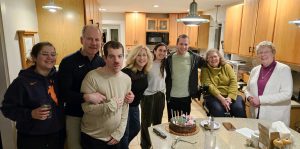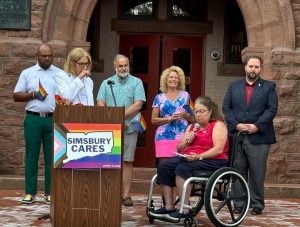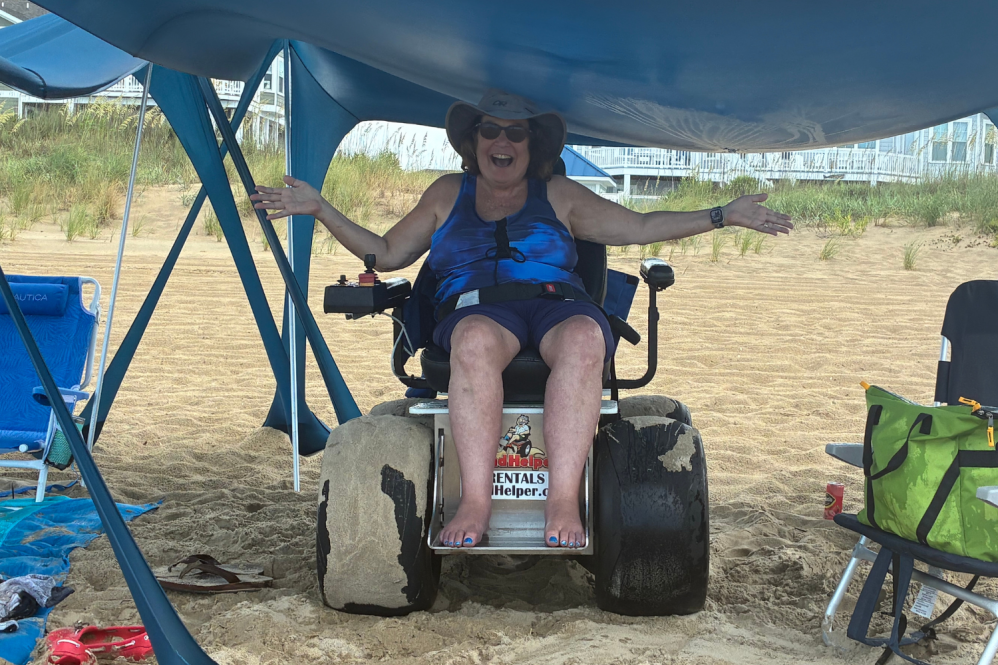 When Cheryl Cook found herself tripping on sidewalks and hearing from others that she seemed to be limping, she knew something was off. Though she had recently had foot surgery, her recovery seemed to be going well—her X-rays showed nothing unusual, and physical therapy offered no relief.
When Cheryl Cook found herself tripping on sidewalks and hearing from others that she seemed to be limping, she knew something was off. Though she had recently had foot surgery, her recovery seemed to be going well—her X-rays showed nothing unusual, and physical therapy offered no relief.
“I did every test—spinal tap, MRIs, blood work—you name it,” said Cook, a retired attorney and longtime community leader in Simsbury. “Everything came back negative, and the diagnosis process was excruciating.”
After two years of uncertainty, Cook’s journey led her to UConn Health’s Amyotrophic Lateral Sclerosis (ALS) and Muscular Dystrophy (MD) Program, where for the first time, she felt surrounded by a full team focused not only on her medical condition but also on her well-being and quality of life. It was here that she was diagnosed with a slow-progressing form of ALS.
ALS, also known as Lou Gehrig’s disease, is a progressive neurodegenerative disorder that affects the nerve cells in the brain and spinal cord responsible for muscle movement. Over time, those nerve cells stop working, causing patients to gradually lose their ability to walk, speak, eat, and eventually breathe. While the rate of progression varies, the disease inevitably changes every aspect of daily life—both for patients and the loved ones who care for them. Families often take on new roles as caregivers, helping with mobility, communication, and daily tasks, all while coping with the emotional weight of watching someone they love lose independence.

Originally conceptualized by Dr. Amanda Hernandez, division chief of Neuromuscular Medicine, the UConn Health ALS and MD Program provides a “one-stop shop” for patients with progressive neuromuscular diseases that often require coordination across multiple specialties.
“We designed this program so that patients can see everyone they need in one visit,” said Hernandez. “Many of our patients use wheelchairs or have significant mobility and fatigue issues. Traveling for multiple appointments across different days is incredibly challenging. Our clinic brings the care to them.”
“When I came to UConn Health, I finally felt supported,” Cook said. “At my first clinic visit, I saw everyone—the neurologist, physical therapist, occupational therapist, speech therapist, and social worker. They came to me, one after another, in the same room. It was overwhelming in the best way possible.”

The multidisciplinary clinic began as a half-day in early 2025 and quickly gained momentum. Under the leadership of Dr. Cristina Viguera Altolaguirre, who joined UConn Health in 2024 and leads the clinic that was initiated and expanded to a full-day model in response to growing demand. Modeled after the Muscular Dystrophy Association’s (MDA) multidisciplinary clinic model used at major academic institutions nationwide, it is UConn Health’s first program of its kind and one of only a few in Connecticut.
Each patient visit is supported by a robust multidisciplinary team that includes neurologists, physiatrists, nursing, physical and occupational therapy, speech therapy, respiratory testing, nutrition, social work, and palliative care.
Dr. Viguera Altolaguirre said the program was designed to meet an urgent and previously unmet need in the community. “These are chronic, often progressive diseases that affect every aspect of a person’s life—mobility, breathing, nutrition, emotional health, and family,” said Viguera Altolaguirre. “The traditional model of care can be fragmented. This clinic brings everyone together in one coordinated, compassionate approach.”
Patients stay in a single room during their visit while specialists rotate through, each evaluating and documenting their findings before regrouping to create a unified plan.
“It’s a true team effort,” said Viguera Altolaguirre. “We’re all communicating face-to-face in real time, which allows us to identify needs, problem-solve, and deliver consistent care. It’s better for patients, and the outcomes and satisfaction reflect that.”
Cook said her first day at the clinic was a turning point. “It’s a long day, but everything happens right there,” she said. “They referred me for home services and helped us get the right equipment. Before, my husband was lifting my manual wheelchair in and out of the car, which was exhausting for him. Now I have a power chair that’s built for my needs. It’s changed both of our lives.”

Her husband, mother, three adult children, brother, sister, and brother-in-law have been by her side through every step. “They’ve been my rock,” she said. “This disease affects all of us, not just me.”
Despite her diagnosis, Cook remains active in the Simsbury community, continuing to participate in civic and volunteer efforts close to her heart. “Staying engaged gives me purpose,” she said. “I’ve always believed in giving back, and that hasn’t changed.”
Recognizing that impact, the clinic integrates social work and palliative care from the very first visit, ensuring families and caregivers receive support and guidance.
“Our social worker meets every patient,” said Viguera Altolaguirre. “We address caregiver stress, financial barriers, and emotional coping. Palliative care helps patients navigate difficult decisions about feeding tubes, ventilation, and future planning—always at their own pace and comfort level.”
The ALS and MD Program has seen rapid growth, drawing patients from across Connecticut and beyond—including those transitioning from other facilities, new diagnoses, and people moving into the area. Patients range from young adults in their 20s to seniors in their 70s living with ALS, while those with muscular dystrophy may be pediatric or adult. Some, like those with spinal muscular atrophy, are now living longer and more independent lives thanks to advances in treatment.
“UConn Health’s ALS and MD clinic fills a major gap in Connecticut’s neuromuscular care,” said Hernandez. “We’re providing the kind of comprehensive, coordinated care these patients deserve—and doing it close to home.”

For Cook, the care team has made a profound difference. “I’ve accepted what’s happening, but I’m not facing it alone,” she said. “Dr. Hernandez, Dr. Viguera, and everyone at UConn Health treat me with compassion and respect. They care about my life, not just my diagnosis.”
“Every patient’s journey is different,” said Hernandez. “But our goal is the same—to make sure no one faces these diseases without coordinated, expert, and compassionate care.”
Cook agrees. “When I leave clinic, I feel like I have an entire team behind me,” she said. “That’s what keeps me going.”
Cook’s experience highlights the difference a truly coordinated, patient-centered approach can make for those facing ALS and other neuromuscular diseases. Through UConn Health’s ALS and Muscular Dystrophy Program, patients like Cook gain access to a full team of specialists working together to address every aspect of care—medical, emotional, and practical—so they and their families never have to navigate the journey alone. As the program continues to grow, it stands as a model of comprehensive, compassionate care, offering patients hope, support, and the strength to keep moving forward.



